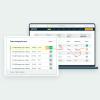Stay competitive and get the visibility you need with small business manufacturing software
Reasons to turn to small business manufacturing software

Integrate your business with cloud manufacturing software
Cloud manufacturing software makes it easier for manufacturers of all sizes to connect with outside e-commerce retailers, warehouses, distributors, and more. Not only that, but cloud manufacturing software can help you improve communication within your manufacturing business — between your teams as well as the other software solutions you use to run sales, accounting, reporting, and more. Such software connects all the data sources and tools small manufacturers use to streamline operations and keep all inventory, sales, and accounting information in one place.
Cloud manufacturing software like Katana allows you to:
-
Sync your inventory data with hundreds of e-commerce, shipping, accounting, and reporting platforms
-
Create custom integrations with other apps using Katana’s open API
-
Build your own apps into Katana using our developer resources and open API
-
Add apps built by other developers and companies to Katana to define your processes

Streamline the flow of data between manufacturing locations
Small business manufacturing software is ideal for manufacturing companies that are spread out across multiple manufacturing sites or for small businesses planning to scale beyond a single location. By storing manufacturing data in the cloud, teams can easily track inventory and manufacturing progress on any device with internet access. Unlike spreadsheets, which are commonly used by small businesses in the manufacturing space, small business manufacturing solutions are built to keep data up-to-date with minimal data entry thanks to a range of automations and integrations with other key software.
Katana’s small business manufacturing software makes it easy to:
-
Get total inventory control for finished products and raw materials
-
Automate inventory transactions and set reorder points to prevent stockouts
-
Track on-hand, committed, and expected stock amounts in real-time
-
Manage product variants and materials in one place
-
Monitor your inventory across multiple warehouses
-
Use barcodes to receive stock

Small business manufacturing software helps you make better decisions
With the help of integrations and automated workflows, small business manufacturing software makes it easy to tap into the vitals of your small business and stay agile and ahead of demand. On the other hand, it also helps you scale your resources up or down depending on incoming sales orders to keep inventory levels and human resource planning optimal and as low-cost as possible — which is essential for small businesses competing with bigger brands with deeper pockets.
Katana gives you the real-time data you need to:
-
Make accurate manufacturing and purchasing decisions with live data
-
Ensure optimal inventory levels at all times
-
Prioritize production based on raw material availability
-
Get task-level control for effective shop floor management
-
Automate manufacturing cost calculations based on your bill of materials and operations
Integrate your small business manufacturing software with the services you know and love
Connect Katana to third-party software or create your own workflows via API
Choose from various e-commerce, accounting, CRM, reporting, and automation integrations to streamline your key business operations. Katana’s small business manufacturing software is built to fit the platforms you need. Take a look at Katana’s growing list of integrations to learn more.
Having the shop floor know what they can or can’t make on a given day is amazing, and replaces our previous “system” of spreadsheets.”
We chose Katana because it seemed to be the most user-friendly software we tried – it is very easy to use and the customer service is great!”
Katana accurately keeps stock of assemblies and ingredients so that I can plan production and get instant feedback on whether we enough resources in stock.”
We also wanted an accurate inventory system for batch planning, warehousing, and sales. Katana fulfills all our needs in a simple, easy solution.”
Small business manufacturing software isn’t just one thing anymore — it’s a stack of different products that all work together. The top layers are additive or “nice to have”. These usually include web-based applications that help manage your overall business. Just like QuickBooks Desktop, these tools let you run reports, look at your numbers, and get a big-picture view of your business.
But below that layer (frequently called Manufacturing IT) consists of highly specialized software designed to help you improve key operational functions — planning, production control, quality control, and inventory management. Some of these applications are built from legacy systems that have been in place in manufacturing firms for decades. Others are designed to help you manage information in a more automated way that wasn’t possible with the old “pencil and paper” approach.
For example, production planning software can show you not just what’s happening with your current orders, but exactly how much inventory you need to build to satisfy future demand. It can also help you plan for raw material shortages and other potential problems that might affect the continuity of your production schedule. An MRP or ERP solution built for small and midsize businesses can give you all these functionalities in one system while integrating with top layer services that handle your e-commerce sales, accounting, reporting, and more.
An enterprise resource planning (ERP) system is a business management software suite containing integrated applications for functions like SCM, human resources (HR), manufacturing, financials, and distribution. While a manufacturing resource planning (MRP) system is part of an ERP with specific functionality used to manage procurement and purchasing, plan production, automate inventory control and track labor.
ERP systems are usually designed for larger companies with sophisticated needs in terms of scalability and integration with other advanced business software, including CRM. MRP for small businesses are extensions of ERP that focus on the manufacturing aspects of the business. They offer basic functionality, including tracking inventories, production operations, and materials procurement.
MRP for small business systems is smaller in scope than ERPs, while an ERP is better suited to larger companies with advanced needs for large-scale integration. It’s important to note that many manufacturers who identify as small businesses may still require an MRP system to meet their requirements.
Most manufacturing ERP software is industry-agnostic, meaning that they are built to support a wide range of manufacturing business operations and processes. However, if you work in industries like food and beverage manufacturing or cosmetics, it is important to find software that supports batch tracking. Katana is used by thousands of manufacturers across a wide range of industries with different workflows. For a full list of supported industry workflows, take a look at our industries page.




